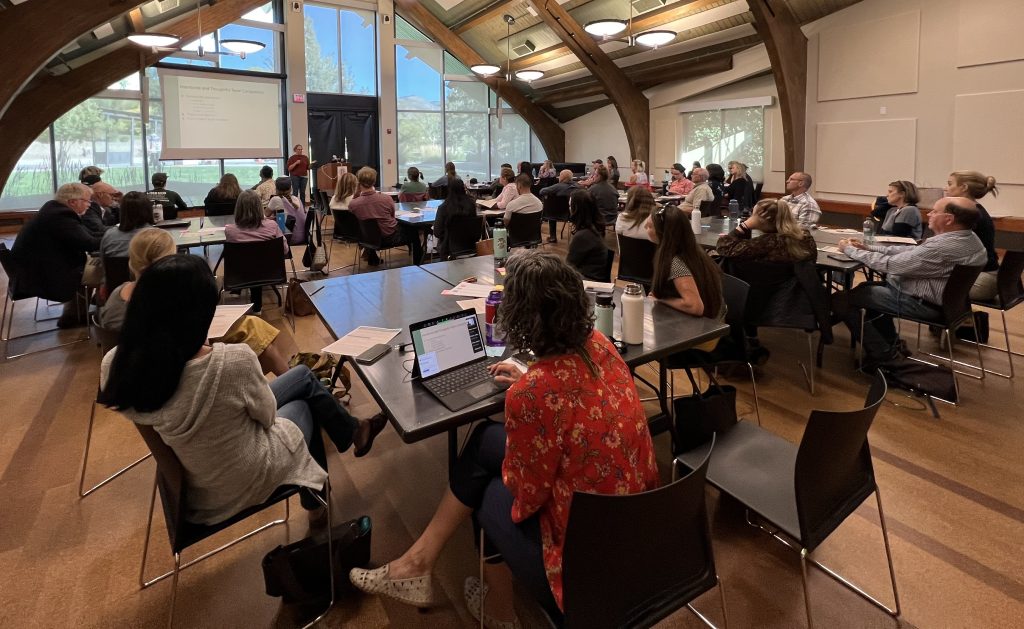
If South Routt School District Superintendent Kirk Henwood had his wish, he would immediately hire two social workers to serve the district’s students, in addition to the two school academic-focused counselors.
However, he does not see that happening any time soon due to lack of long-term funding and a profession-wide shortage of school social workers, especially to serve rural areas.
So right now, the district employs a secondary-level certified school counselor with a focus on academics with some mental health duties. When students need counseling, Mind Springs Health is the provider partner. But appointment availability at Mind Springs that also fits family schedules in South Routt can cause delays in care, Henwood said.
Utilizing online counseling support such as I Matter Colorado is another option, but Henwood said some secondary students prefer in-person counseling sessions.
Mental health social workers are not funded in the regular school budget in Soroco, so the district has used state and foundation grants. That start-stop type of funding does not foster stability to hire professionals, Henwood said. One posted three-year grant-funded social worker position for the district has been vacant for a year.
“Just because there are grants and data, doesn’t mean there is person to fill the position,” said Henwood, noting that salary levels and housing struggles continuing to complicate hiring in a competitive market for mental health professionals.
Such gaps, opportunities and strengths in mental and behavioral health care support are the focus of the recently completed 2023 Yampa Valley Behavioral Health Landscape Scan. The study was commissioned by the Craig-Scheckman Family Foundation in Steamboat Springs and UCHealth Yampa Valley Medical Center Foundation, and coordinated by nonprofit The Health Partnership of Northwest Colorado. The study was led by End Grain Research and Evaluation and a team of community researchers from Routt and Moffat counties.
The “landscape scan” focused on specific populations in the valley, including youth and young adults, LGBTQ+ community in Moffat County and adult males working in the valley’s traditional economies, as well as Latinx-identifying members of those three groups.
Health Partnership Executive Director Brittney Wilburn said the deeper dive into the lived experiences and mental health needs in those specific categories grew out of the results of the 2022 Yampa Valley Community Health Needs Assessment, or CHNA, which is updated every three years.
Organizers say the deeper dive highlighted two common themes across groups: general lack of open and normalized perception around mental health including stigma, and how housing and income inequality created profound life stressors leading to mental health concerns and limiting the ability to seek formal help. Participants universally described an “old school mentality” throughout the Yampa Valley and the perception that the community at large expects people to be able to individually manage their mental health.
Kristina Gustafson, Health Partnership care coordinator in Craig, said she views the behavioral health scan that included information collected in small focus group discussions and individual interviews “as an overview of the culture and the needs of the community by the community members.”
Health Partnership and mental health care officials hope community members will review the landscape scan online on the Community Impact section of TheHealthPartnership.org website. Community groups also can request an in-person presentation.
Insights from young people highlighted a general lack of mental health support in the community at large and within school settings.
“Specifically, they desire ongoing learning opportunities to develop the tools to weather current and future mental health challenges and to support their peers,” Wilburn said. “Further, young people desire a school environment that offers confidential, student-centered, culturally aware and easily accessible supports starting in elementary school. Young people also consistently shared that parents and caregivers need resources to support themselves, as well as to learn how to support youth mental wellness.”
Henwood said Soroco officials took two messages from the scan to heart, including the need for increased confidential counseling and access to trusted adults. This school year the district is utilizing the 7 Mindsets program to teach the basic skills for students to navigate struggles and help build high-quality relationships.
The landscape scan also sought to understand the behavioral health experiences and needs of the LGBT+ community in Moffat County. That group can feel very isolated and experience poor engagement with the formal mental health support system and thus may not seek the care they need, Wilburn said.
Dozens of men who work in the valley’s traditional economies of agriculture, ranching and mining were interviewed for the landscape scan. This group noted they frequently lean on informal support, especially their wives, when experiencing life struggles, and many shared they “keep busy” and recreate outdoors to cope with challenges.
“These first-hand experiences and stories help bring to life what the data continues to tell us,” Wilburn said. “We will move this work forward working with individuals from the communities of focus and community partners so that the solutions we create truly meet the needs of our rich and diverse community.”
